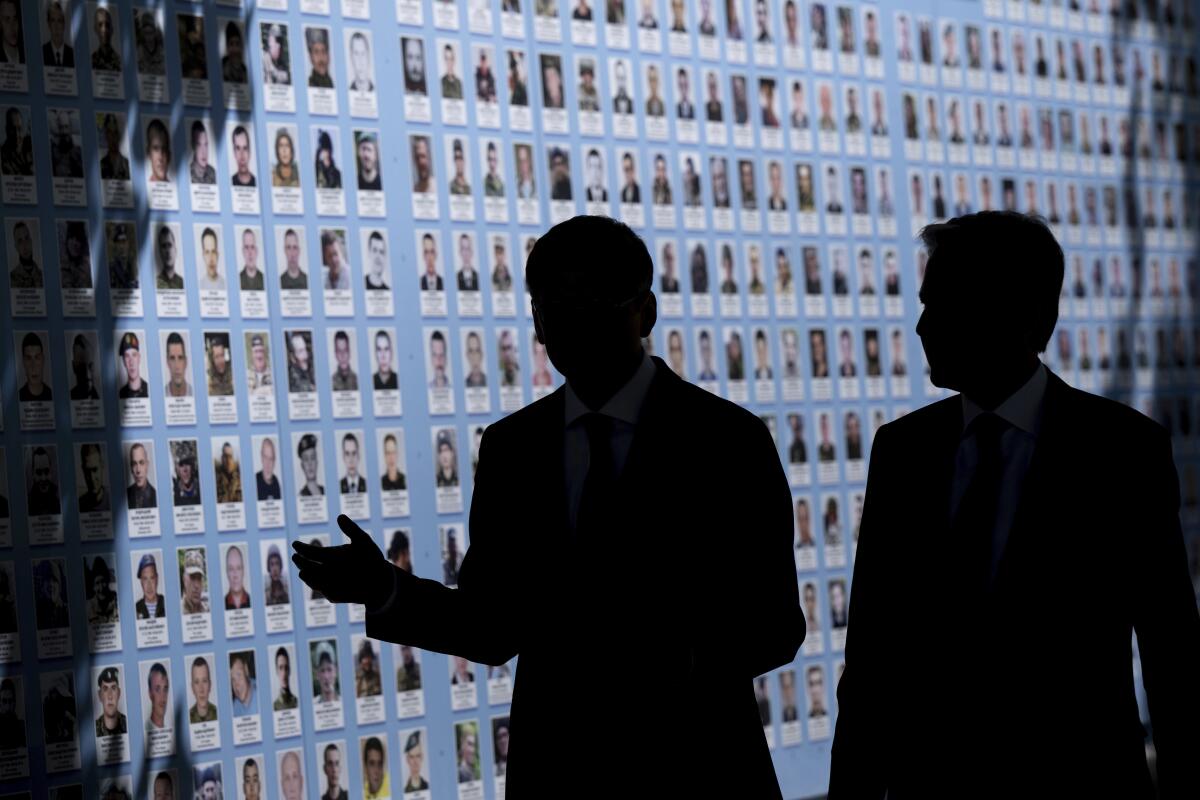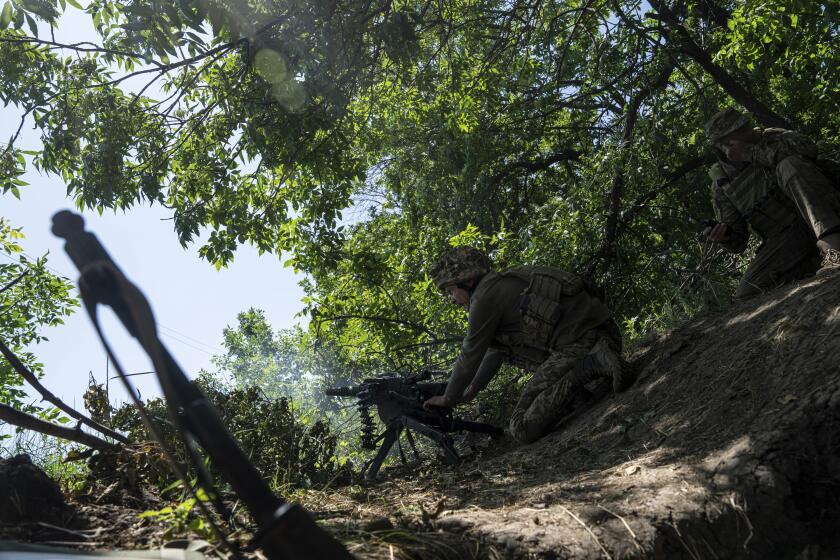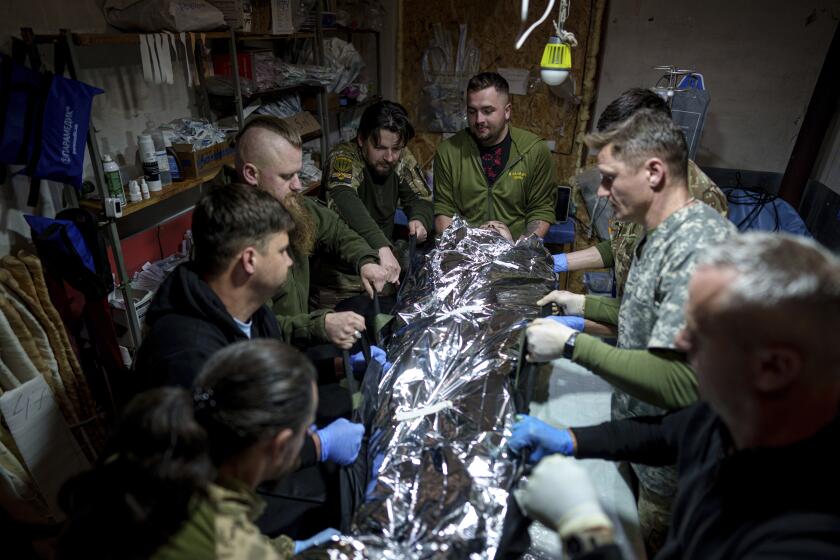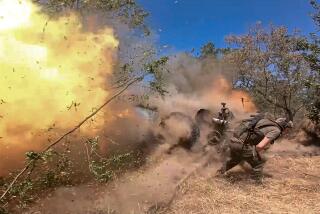Ukrainian troops pull out of some areas amid Russian offensive

- Share via
KYIV, Ukraine — Ukrainian forces withdrew from some parts of the country’s northeast and battled Russian troops in other areas Wednesday, as President Volodymyr Zelensky’s decision to postpone all of his upcoming foreign trips underscored the seriousness of the threat his soldiers face.
Against that grim backdrop, visiting U.S. Secretary of State Antony J. Blinken sought to reassure Ukraine of continuing American support, announcing a $2-billion arms deal. Most of the money comes from a package approved last month.
The top diplomat’s trip comes as Russian troops press a new offensive in Ukraine’s Kharkiv region. It began last week, marking the most significant border incursion since the full-scale invasion began in 2022 and forcing thousands to flee their homes. In recent weeks, Moscow’s forces have also sought to build on gains in the eastern region of Donetsk. Taken together, the developments mean the war has entered a critical stage for Ukraine’s depleted army.
Ukraine’s General Staff reported late Tuesday that troops fell back from two areas in Kharkiv — Lukyantsi and Vovchansk — “in order to save the lives of our servicemen and avoid losses.” Russia said it had captured Lukyantsi.
It was not possible to independently verify either side’s claims.
Ukrainian president signals to U.S. secretary of State that the need is dire, but that the war against Russia is not lost.
Vovchansk — just 3 miles from the Russian border — has been the focus of much of the recent fighting, and Ukrainian and Russian troops battled in its streets Wednesday. Oleksii Kharkivskyi, head of the city’s patrol police, said Russian troops were taking up positions in the city, while the Ukrainian General Staff said its forces were trying to flush them out.
Gunfire could be heard in the background of a video the police official posted on his Instagram page.
The Ukrainian presidential office said additional reinforcements were being deployed in the region, including army reserve units.
At the dangerous juncture, Blinken was in Ukraine to highlight U.S. support, though most of the money he announced Wednesday, about $1.6 billion, comes from the $60 billion allotted to Ukraine in the supplemental foreign assistance legislation passed by Congress and signed by President Biden, officials said.
He said the money would be used for three purposes: to provide weapons in the short term, to invest in Ukraine’s defense-industrial base and to allow Ukraine to buy military supplies from other countries.
Could Ukraine lose the war? Once nearly taboo, the question hovers in Kyiv, but Ukrainians believe they must fight for their lives against Putin’s troops.
At a news conference with Blinken, Ukrainian Foreign Minister Dmytro Kuleba said of the aid: “This is a very powerful message to both our friends and our enemies.”
Blinken said Washington understands the urgency of Ukraine’s need for additional air defenses to protect against the Russian onslaught and was prioritizing them in its assistance.
He added that the U.S. has “not encouraged or enabled strikes outside of Ukraine” using American-supplied long-range weapons. That decision is up to Kyiv authorities, he said.
The United Kingdom has said it placed no limits on Ukraine’s use of weapons that Britain supplies to hit targets on Russian soil, but Germany, another major supporter, has balked at that and ruled it out for fear of escalating the conflict.
Russia is opening new fronts in order to stretch Ukraine’s army, which is short of ammunition and manpower, along the roughly 620-mile front line, hoping defenses will crumble. Russian artillery and sabotage raids have also been menacing Ukraine’s northern Chernihiv and Sumy regions.
Dwindling ammunition threatens Ukraine’s hold on the front line under a withering assault by Russian artillery.
The Russian Defense Ministry also claimed that its troops have retaken the village of Robotnye in the southern Zaporizhzhia region. Ukrainian forces had gained control of the village last August in what was seen as an important advance in a counteroffensive that eventually petered out.
Elsewhere in Ukraine’s southern regions, an aerial attack on the central district of Kherson wounded 17 civilians, the regional prosecutor’s office said. And a Russian missile attack injured six people in Mykolaiv, according to Ukraine’s rescue service.
Still, the Institute for the Study of War said late Tuesday that the pace of Russia’s advance in the Kharkiv border region, where it launched an offensive late last week and has made significant progress, has slowed. The Washington-based think tank said Moscow’s main aim there is to create a “buffer zone” that will prevent Ukrainian cross-border strikes on Russia’s Belgorod region.
Even so, Zelensky’s office announced Wednesday that he had canceled all of his upcoming foreign visits and would try to reschedule them.
Zelensky had been expected to visit Spain, and perhaps Portugal, later this week. No reason was given for his decision, but the difficulties on the front line hung over it.
In the span of two days, Russia has captured some 40 square miles that encompass at least seven villages, most of them already depopulated.
Meanwhile, Russian air defenses shot down several Ukrainian missiles over the Black Sea and near the Belbek air base, Sevastopol Gov. Mikhail Razvozhayev said. Sevastopol is where the Russian Black Sea Fleet is headquartered.
The fragments of downed missiles fell into residential areas but caused no casualties, Razvozhayev said.
Russian air defenses also shot down nine Ukrainian drones, two Vilha rockets, two anti-radar HARM missiles and two Hammer guided bombs over the Belgorod region early Wednesday, the Defense Ministry said.
Vasily Golubev, the governor of the Rostov region, said two drones attacked a fuel depot. He said there were no casualties or fire.
Ukraine has launched a steady series of drone attacks on oil refineries and fuel depots across Russia over the last few months, causing significant damage.
Lee and Novikov write for the Associated Press. Joseph Wilson contributed to this report from Barcelona, Spain.
More to Read
Sign up for Essential California
The most important California stories and recommendations in your inbox every morning.
You may occasionally receive promotional content from the Los Angeles Times.














